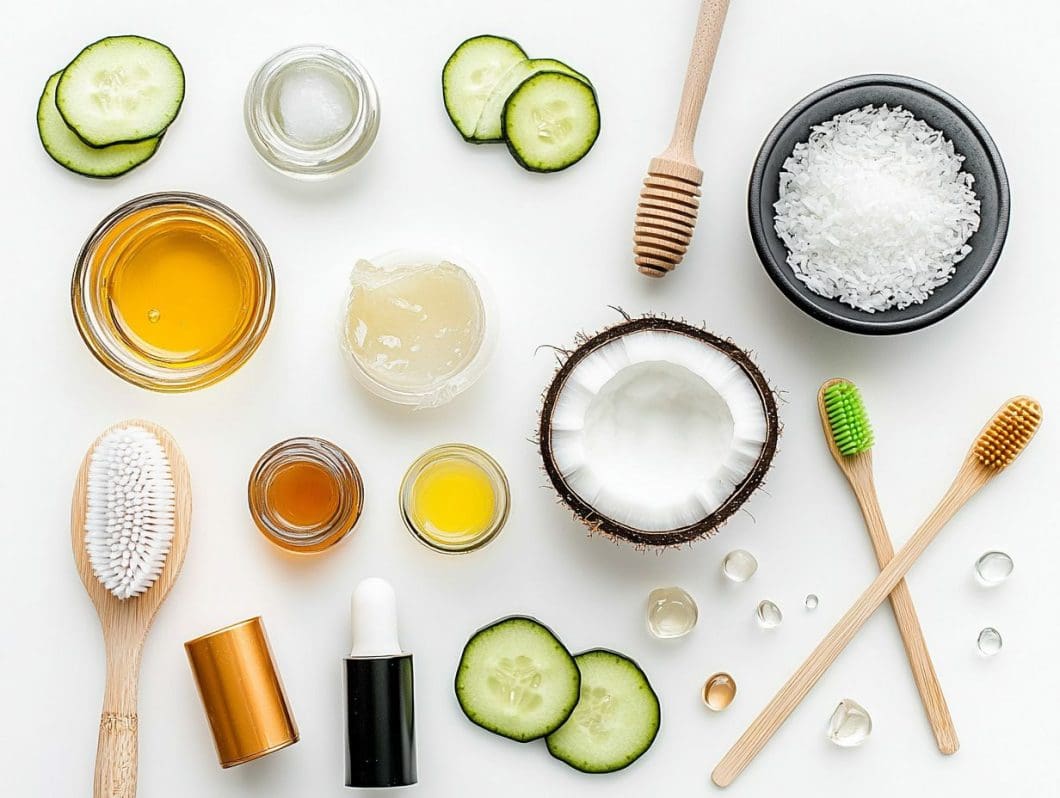In a world where beauty products often come with hefty price tags and complicated ingredient lists, beauty hacks using everyday household items offer a refreshing alternative.
From DIY hair masks to homemade face scrubs, these cost-effective and natural solutions can transform your beauty routine without breaking the bank.
This article explores various beauty hacks for hair, skin, nails, and makeup, while also addressing safety considerations.
Discover the creative potential of what you already have at home and elevate your beauty game effortlessly!
Key Takeaways:
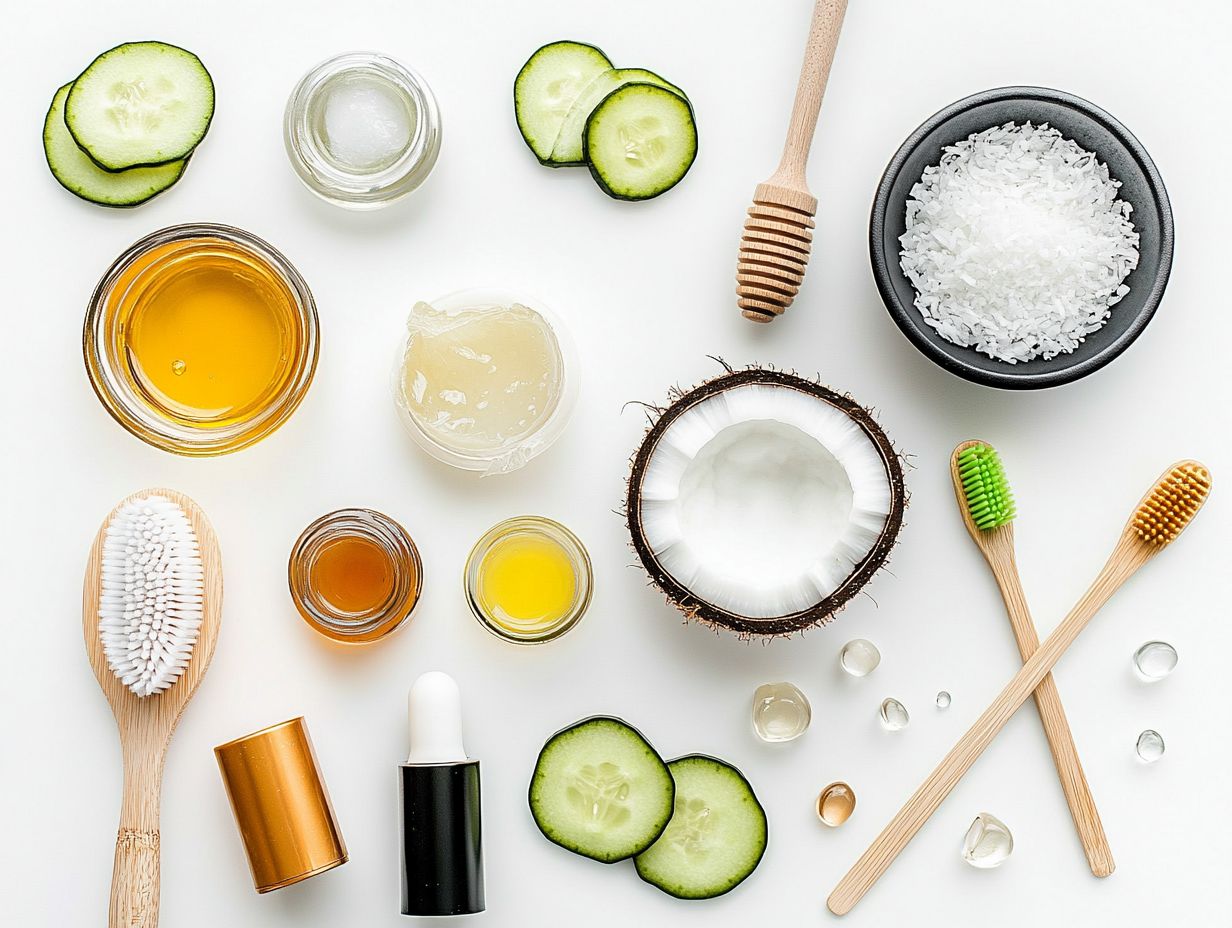
- Save money and skip harsh chemicals by using household items for beauty.
- Revive your hair, skin, and nails with DIY treatments using items from your pantry.
- Get creative with everyday household items to achieve flawless makeup looks.
What are Beauty Hacks?
Beauty hacks refer to innovative and often unconventional techniques that utilize everyday household items to enhance beauty and promote skin health. These methods can encompass a range of economical beauty solutions, such as employing honey as a moisturizing lotion, to effective homemade remedies like coffee treatments for puffy eyes, making them accessible to anyone looking to improve their beauty regimen.
With the increasing influence of beauty bloggers and experts advocating for DIY beauty hacks, individuals are discovering the benefits of incorporating natural ingredients into their daily skincare routines.
The appeal of these beauty hacks lies not only in their affordability but also in their adaptability, allowing individuals to customize solutions based on their unique skin types and preferences. For example, a simple blend of avocado and olive oil can transform dry hair into a vibrant mane, while a mixture of sugar and coconut oil serves as an exfoliating scrub that reveals radiant skin.
Additionally, using green tea bags to diminish dark circles provides both immediate benefits and the potential for long-term enhancements in skin health.
By embracing these techniques, individuals can take charge of their beauty rituals while cultivating a deeper connection to the ingredients they utilize.
Benefits of Using Household Items for Beauty
Utilizing household items for beauty offers several advantages, notably cost-effectiveness, accessibility, and the opportunity to leverage natural ingredients that enhance skin health.
By choosing DIY beauty solutions, individuals can reduce expenses while formulating effective homemade remedies from common items such as apple cider vinegar and baking soda, which serve as excellent alternatives for exfoliating scrubs and cleansing face masks.
Moreover, these ingredients typically present a lower risk of skin irritation compared to commercial beauty products, positioning them as a safer option for a diverse range of skin types.
Cost-Effective and Natural Alternatives
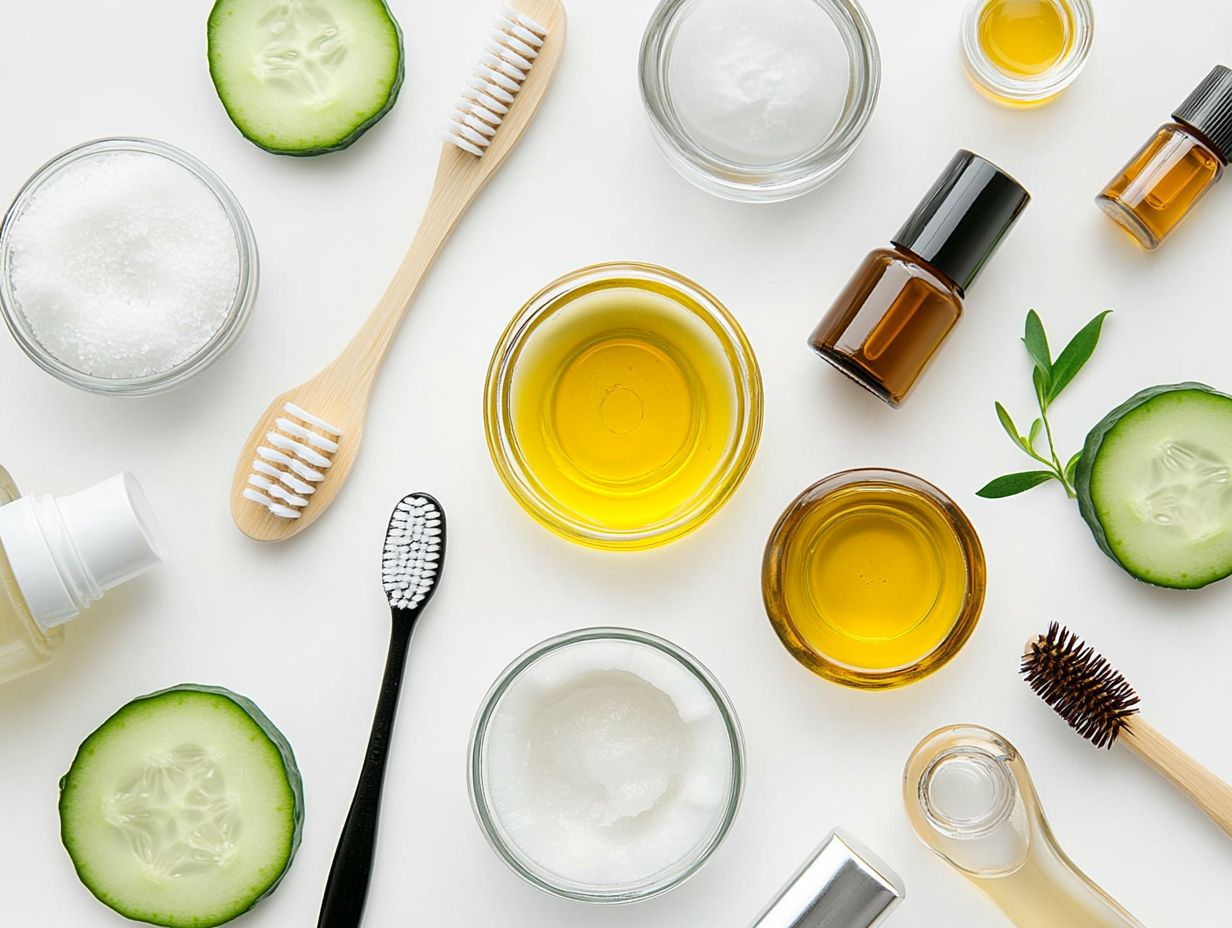
Cost-effective and natural alternatives to commercial beauty products are increasingly sought after due to their affordability and minimal environmental impact. Ingredients such as coconut oil and olive oil serve as excellent moisturizers and can be seamlessly integrated into any beauty regimen.
Additionally, homemade toners made from apple cider vinegar or green tea not only provide significant skin health benefits but also eliminate the harsh chemicals commonly found in many store-bought products, making them suitable for a variety of skin types, including both oily and dry.
These alternatives contribute to a gentler beauty routine while promoting a healthier lifestyle. For example, baking soda can be effectively utilized as a gentle exfoliant, aiding in the removal of dead skin cells and unclogging pores. Furthermore, honey’s natural antibacterial properties make it an ideal choice for treating blemishes and providing hydration.
Simple scrubs made from sugar or coffee grounds can invigorate the skin, resulting in a smooth and radiant appearance. For more tips, check out 10 Beauty Hacks Using Common Household Items.
By adopting these straightforward and effective ingredients, individuals can enjoy a beauty routine that is not only budget-friendly but also aligns with a commitment to sustainability and overall wellness.
Beauty Hacks for Hair
Beauty hacks for hair frequently incorporate DIY hair masks and treatments formulated from common household items, offering effective solutions for a range of hair concerns. For example, a straightforward moisturizing oil blend utilizing coconut oil and honey can provide deep hydration for dry hair, while a coffee treatment can stimulate the scalp and enhance hair health.
These natural ingredients not only nourish the hair but also offer a cost-effective alternative to commercial hair products, contributing to their popularity among both beauty enthusiasts and professionals.
DIY Hair Masks and Treatments
DIY hair masks and treatments can be effectively prepared at home utilizing natural ingredients that nourish and revitalize hair. For instance, a combination of coconut oil and honey serves as a powerful moisturizing treatment, particularly beneficial for addressing dry and frizzy hair.
Additionally, oatmeal can be employed as a hair mask to soothe the scalp and impart shine, making it an excellent choice for individuals seeking natural remedies to enhance hair health.
These straightforward yet effective recipes often incorporate common ingredients found in most kitchens, rendering them both cost-effective and convenient. Olive oil is another highly regarded ingredient known for its capacity to strengthen and restore damaged hair. Individuals with oily hair may find yogurt and lemon juice advantageous, as these ingredients work synergistically to balance oil production while preserving moisture.
By comprehending the unique properties of each ingredient, individuals can identify the most suitable DIY treatment tailored to their specific hair needs and preferences, ultimately ensuring a healthier and more vibrant appearance.
Beauty Hacks for Skin
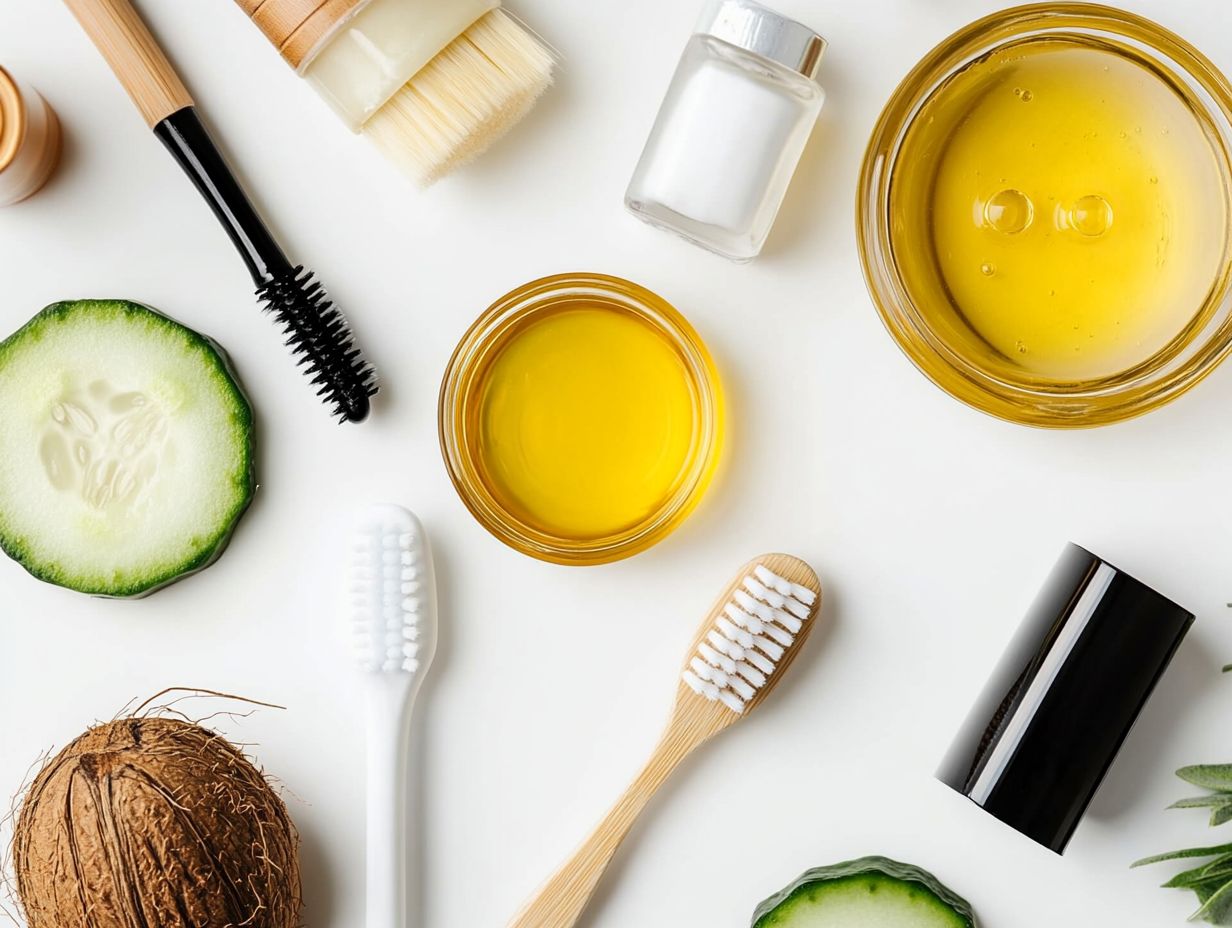
Beauty hacks for skin include a diverse array of homemade face masks and scrubs that employ common household items to promote skin health.
These DIY remedies frequently incorporate ingredients such as honey for hydration, baking soda for gentle exfoliation, and apple cider vinegar for balancing skin pH, effectively addressing concerns such as oily skin or dry patches.
Integrating these natural solutions into a daily skincare routine can substantially enhance one’s overall beauty regimen and contribute to healthier, glowing skin.
Homemade Face Masks and Scrubs
Homemade face masks and scrubs are straightforward to create and can significantly enhance skin health by utilizing natural ingredients readily available in one’s kitchen. For example, a coffee-based treatment can serve as an effective natural exfoliating scrub, helping with reducing the appearance of dull skin while promoting hydration. Additionally, a simple mixture of yogurt and oatmeal can nourish and cleanse the skin effectively. These homemade remedies not only address specific skin concerns but also preserve the integrity of the skin’s natural barrier.
By combining ingredients such as honey and avocado, one can formulate a hydrating mask that is particularly beneficial for dry skin, while the combination of turmeric and coconut oil is highly effective in combating inflammation.
It is essential to consider the unique needs of one’s skin type and to conduct a patch test prior to applying any new product. Customizing these recipes by incorporating essential oils or herbs can further enhance their beneficial properties. For individuals with oily skin, adding lemon juice to a clay mask can assist in controlling excess oil production, whereas those with sensitive skin may prefer soothing chamomile to alleviate irritation.
Beauty Hacks for Nails
Beauty hacks for nails emphasize at-home manicure and pedicure techniques that can enhance one’s nail care routine without incurring significant expenses.
By employing cost-effective beauty solutions, such as utilizing a bobby pin for nail art or scotch tape for precise lines, individuals can attain salon-quality results within the comfort of their own homes.
These do-it-yourself beauty methods not only provide financial savings but also encourage creativity and personalization in one’s nail care regimen.
At-Home Manicure and Pedicure Tips
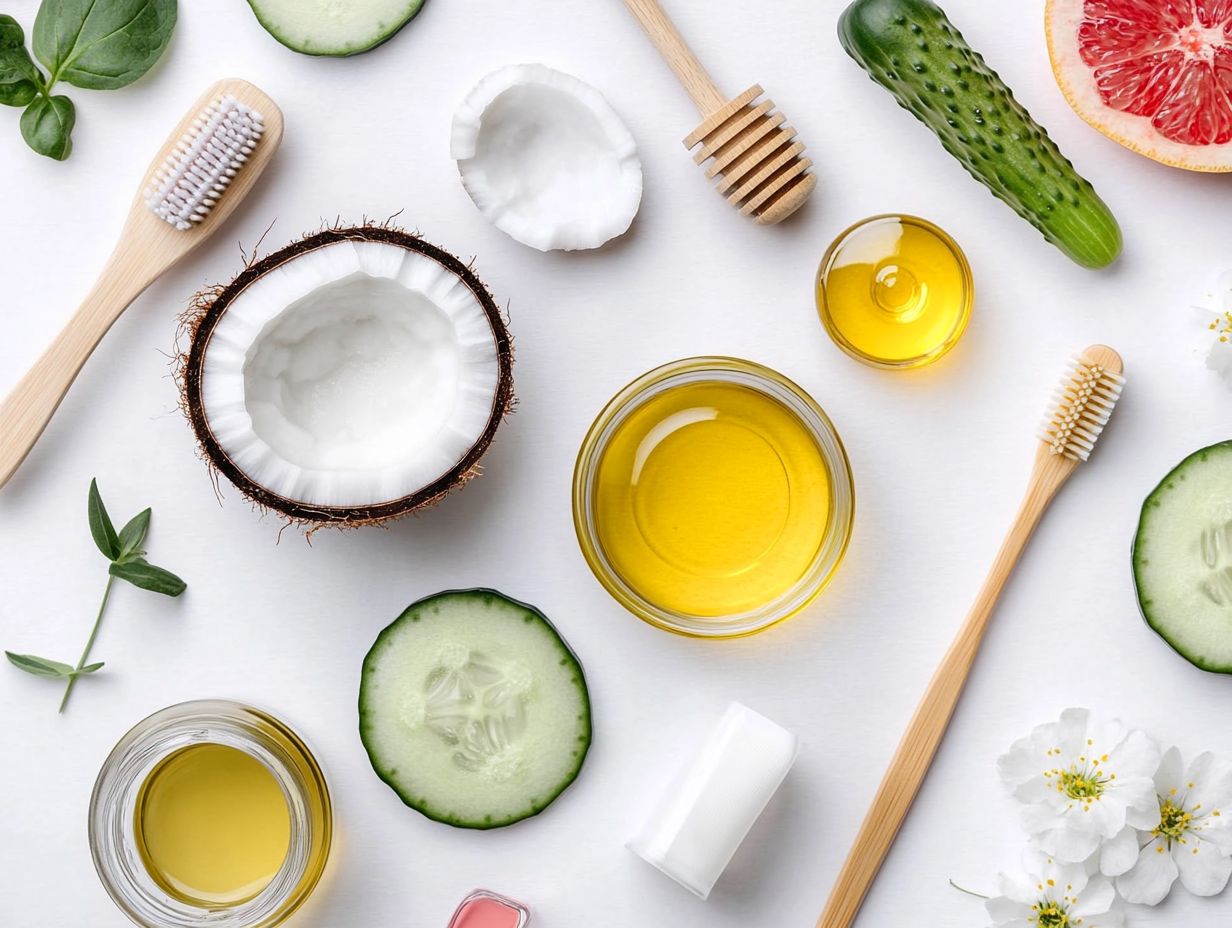
At-home manicure and pedicure techniques can significantly enhance your nail care routine and improve the overall health of your nails. Simple methods, such as soaking nails in warm olive oil or applying a moisturizing lotion, can effectively nourish the cuticles. Additionally, a gentle exfoliating scrub made with sugar and honey can provide a refreshing finish. These natural approaches not only enhance the appearance of nails but also contribute to a more effective beauty regimen.
By incorporating regular practices, such as filing in one direction and avoiding harsh chemicals, individuals can promote the longevity and strength of their nails. Establishing a weekly routine, complemented by quality tools such as nail clippers and buffers, ensures optimal care.
Applying a protective base coat before coloring is essential, as it safeguards nails from potential stains while allowing for vibrant polish colors to shine. Furthermore, utilizing essential oils like tea tree or lavender can assist in maintaining nail health by combating infections and providing soothing benefits, thereby reinforcing the significance of self-care in every at-home treatment.
Beauty Hacks for Makeup
Beauty hacks for makeup frequently entail innovative applications of household items that can improve both the application and longevity of makeup, all without the necessity of costly products.
For example, utilizing safety pins to create custom eyelash curls or employing Vaseline as a highlighter are inventive techniques recommended by various beauty experts for achieving a refined appearance.
These economical beauty hacks not only provide financial savings but also introduce distinctive methods to enhance one’s makeup routine.
Creative Uses for Common Household Items
Creative applications of common household items can significantly transform makeup application and enhance overall beauty routines. For instance, utilizing a kitchen sponge as a substitute for a beauty blender offers an effective and economical alternative for blending foundation, while scotch tape can be employed to create precise eyeliner lines.
These innovative makeup techniques not only highlight the versatility of everyday items but also reflect the increasing trend among beauty professionals to adopt DIY methodologies in beauty regimens.
By thinking creatively, one may find that a simple cotton swab effectively addresses makeup mishaps or applies precise touches of highlighter. Additionally, a teaspoon can serve as an excellent tool for curling lashes; its curvature allows for achieving the desired lift without the need for multiple tools.
Adopting these inventive strategies not only conserves financial resources but also adds a personalized element to one’s beauty regimen, demonstrating that practical solutions are often readily available within the home.
Safety Considerations
In the realm of DIY beauty hacks, it is imperative that safety considerations are prioritized, particularly with regard to potential skin irritation and allergies.
A comprehensive understanding of one’s skin type, along with the execution of patch tests prior to the application of homemade remedies, is essential to mitigate the risk of adverse reactions, especially when utilizing ingredients such as baking soda or apple cider vinegar.
By following these safety guidelines, individuals can reap the benefits of DIY beauty hacks while safeguarding their skin health.
Precautions and Allergies
Precautions and allergies are critical factors to consider when utilizing DIY beauty hacks, as certain natural ingredients may trigger adverse reactions in sensitive individuals. For instance, while honey is generally regarded as safe, individuals with specific allergies may experience irritation, making it essential to verify the safety of ingredients prior to use.
By taking the necessary time to identify potential allergens and conducting patch tests, individuals can effectively and safely integrate homemade remedies into their skincare and beauty regimens.
It is recommended to perform a patch test by applying a small amount of the DIY mixture to the inner arm and monitoring for any signs of irritation or allergic response over a 24-hour period. Awareness of common allergens—such as essential oils, nut oils, and citric acids—can significantly mitigate the risk of complications.
Furthermore, utilizing only high-quality, organic ingredients that are free from harmful additives and toxins is vital for maintaining optimal skin health. Ultimately, understanding both personal sensitivities and the specific properties of each component will enable individuals to enjoy the benefits of homemade beauty products without experiencing unwanted side effects.


